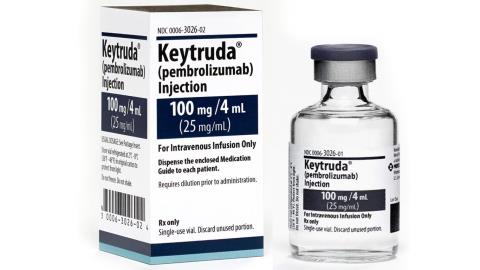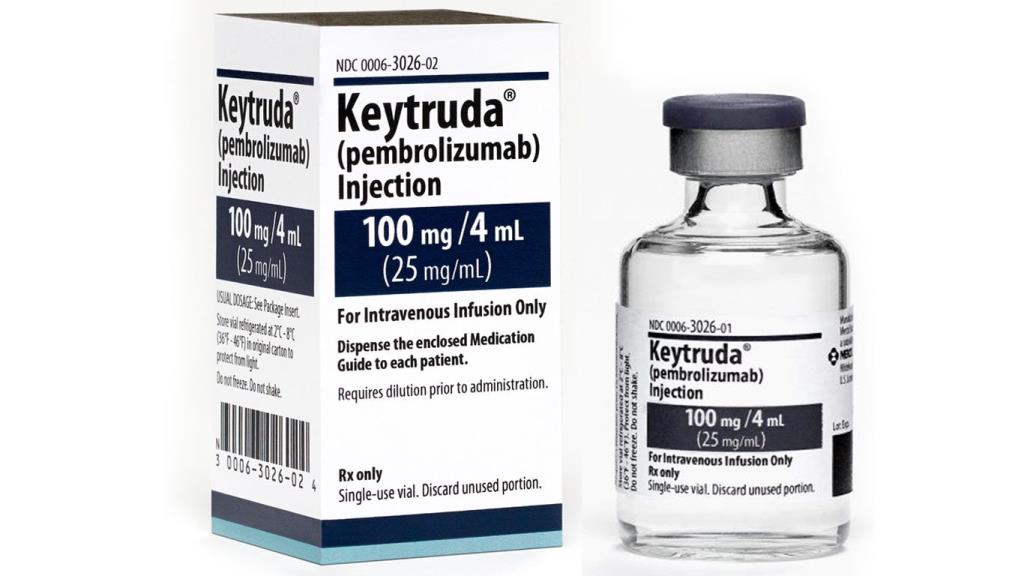What do you know about the late-stage cancer drug Keytruda (pembrolizumab)?

What is Keytruda (pembrolizumab)? Used in what cases and what should be noted when using. The following article briefly introduces Keytruda (pembrolizumab), let's find out with SignsSymptomsList!
Active ingredient: pembrolizumab
Dosage form & content: solution for intravenous infusion; 100 mg/4ml (25mg/mL)
content
- 1. What is Keytruda (pembrolizumab)?
- 2. Indications for Keytruda (pembrolizumab)
- 3. Instructions for taking Keytruda (pembrolizumab)
- 4. Precautions when using Keytruda (pembrolizumab)
- 5. For pregnant and lactating women
- 6. Keytruda (pembrolizumab) side effects
- 7. How to store Keytruda (pembrolizumab)
1. What is Keytruda (pembrolizumab)?
The body's immune system has the function of recognizing and destroying foreign cells (cancer cells, mutant cells, etc.). However, some cancer cells have the ability to make the immune system unable to recognize and destroy. Keytruda immunotherapy treatment (pembrolizumab) has been shown to "neutralize" this ability of cancer cells, thereby helping immune cells recognize the cancer cells' attack and destroy them. they.
Currently, the main methods of cancer treatment are still surgery, chemotherapy, radiation therapy, etc. In which, surgery and radiation therapy play an important role in the treatment of some cancers at early stages. - when the tumor is still localized. However, the effectiveness of chemotherapy is still limited and the side effects of chemotherapy often make it difficult for patients to continue long-term treatment.
See more: The treatment methods for liver cancer you need to know
2. Indications for Keytruda (pembrolizumab)

The drug is indicated in the following cases:
- Malignant melanoma
- Non-small cell lung cancer
- Classic Hodgkin's Lymphoma
- Urinary tract carcinoma
- Head and neck cancer
- Stomach cancer
3. Instructions for taking Keytruda (pembrolizumab)
The drug must be given intravenously over 30 minutes, not by rapid intravenous injection or intravenous bolus.
3.1. Mixing
- Before dilution, the vial can be removed from the refrigerator (temperature ≤ 25oC) up to 24 hours.
- Withdraw the required amount of solution 4ml (100mg) and dilute with 10-100ml of 0.9% or G5% NaCl solution. Mix the diluent by gently inverting the infusion bag.
- The diluted solution must not be frozen. Chemical and physical stability has been demonstrated for 24 hours at 2 – 8oC or 6 hours at room temperature (≤ 25oC).
- Intravenous administration using an existing infusion line or additionally connected to a sterile filter element, is pyrogen-free and low in protein adhesion with a filter pore size of 0.2–5 µm. Do not infuse other drugs at the same time through the same infusion set.
3.2. Dosage
- Classic Hodgkin lymphoma (cHL), chemotherapy-naive non-small cell lung cancer, urothelial carcinoma, head and neck squamous cell carcinoma, gastric cancer: 200 mg every 3 weeks .
- Chemotherapy non-small cell lung cancer or melanoma: 2 mg/kg every 3 weeks.
Treatment of clinically stable patients with initial evidence of disease progression should be continued until disease progression is established.
Note: Mild to moderate renal impairment, mild hepatic impairment, people ≥ 65 years old: no dose adjustment necessary.
4. Precautions when using Keytruda (pembrolizumab)
- Permanently discontinue treatment with recurrent Grade 4 or Grade 3 adverse reactions
- In patients with classic Hodking lymphoma, grade 4 hematological toxicity should be temporarily discontinued and corticosteroids given until the response is grade 0-1, then gradually reduce the corticosteroid dose for at least 1 month. Keytruda may be reintroduced within 12 weeks of the last dose if the adverse reaction remains grade 0-1 and the corticosteroid dose has been reduced to ≤ 10 mg or equivalent daily.
- Immune-related adverse reactions include: interstitial pneumonia, colitis, hepatitis, endocrine disease, nephritis, severe skin reactions, etc.
- Increased mortality in patients with multiple myeloma when Keytruda (pembrolizumab) was added to a thalidomide and dexamethasone analog.
- The drug may have a slight effect on the ability to drive and use machines.
- The drug should be abandoned if there are foreign particles in the solution (color clear/slightly opalescent, colorless/light yellow).
5. For pregnant and lactating women
- Use only when absolutely necessary or when the benefits outweigh the risks. Avoid breast-feeding during treatment with the drug, discontinue use or discontinue breast-feeding with a nursing mother.
- Contraception should be used during and for at least 4 months thereafter.
6. Keytruda (pembrolizumab) side effects

Common side effects include itching, rash, cough, fever, nausea, and constipation. Other side effects that occur in about 1% to 10% of people taking Keytruda (pembrolizumab) include:
- dry eyes
- anemia
- High Blood Pressure
- headache
- fever, chills, myasthenia
- flu-like symptoms
- Abdominal pain, constipation, dry mouth
- decreased appetite, taste distortion
- muscle pain, limb pain, arthritis, weakness, edema
- severe skin reactions, vitiligo, acne, dry skin, eczema
Where patients experience serious immunological side effects including pneumonia; inflammation of the endocrine organs causes inflammation of the pituitary gland; thyroiditis causing hypothyroidism or hyperthyroidism in different patients; pancreatitis causes type 1 diabetes and diabetic ketoacidosis. In addition, some patients may experience colitis, hepatitis, and drug-induced nephritis.
7. How to store Keytruda (pembrolizumab)
Store in the refrigerator (2°C – 8°C).
Expiry date:
- Unopened vial: 3 years.
- After opening: The reconstituted or diluted solution should be used immediately. The reconstituted or diluted solution must not be frozen. Keytruda (pembrolizumab) has been shown to be stable for 96 hours at 2°C to 8°C or up to 6 hours at room temperature (at or below 25°C).
If the medicine is to be stored in the refrigerator, the vials and/or intravenous bags should be left at room temperature before use.
Keytruda drug (pembrolizumab) is a good sign for cancer patients, especially advanced diseases such as metastatic cancer .. can still hope in Keytruda! SignsSymptomsList has informed you the most necessary knowledge when taking medicine. Please read the instructions for use carefully when using the medicine!
Pharmacist Ninh Thi Hoa Huong